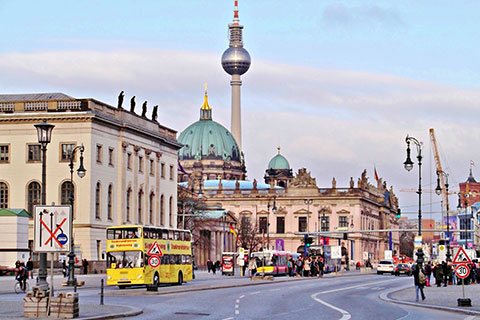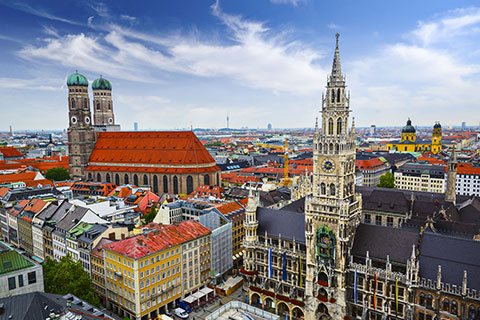
Study in Germany
Last edited on 28 Feb 2026
Welcome to Germany!
The Federal Republic of Germany lies in the heart of Europe. It is a cosmopolitan, democratic country with a rich tradition as well as a vibrant modern life. Germany is one of the world’s strongest economies and offers an innovative research and education landscape. At the same time, it has a dynamic cultural scene. Germany is the European Union’s most populous nation with over 82 million inhabitants. It is surrounded by nine neighboring countries, and its territory encompasses roughly 357,000 square kilometres - stretching from the North Sea and the Baltic Sea in the north to the Alps in the south. Since 1949 the Federal Republic of Germany has been a democratic parliamentary federation. It is made up of 16 Länder (states), each with its own constitution, parliament and government. Germany is a modern and open-minded country with high quality of life, influenced in many ways by multinational diversity. Berlin is the capital of Germany.
Germany is a country characterized by variety. Trendy and modern Berlin can seem a world away from the more traditional and conservative Munich. The gleaming skyscrapers of Frankfurt form a stark contrast to quaint Heidelberg. And if bustling and fast-paced Hamburg becomes too much, you can always retreat to the peaceful and picturesque Middle Rhine region.
Higher Education System
In Germany there are 399 institutions of higher education*, of which 111 are entitled to award doctorates, and around 230 universities of the applied sciences. Courses at German Higher Education Institutions cover more than 400 disciplines, and many institutions offer courses taught in English that lead to internationally recognized degrees, including Master’s and PhD. Prominent fields of study include: Engineering Sciences, Natural Sciences, Economics and Business Administration, Arts, Music, Architecture and Design – and there are over 1,900 international programs*, most of them taught in English, listed on the DAAD database. Almost half of Germany’s 2.4 million current students are women. With around 340,000 foreign students* enrolled at German institutions of higher education, Germany has the fifth highest number of foreign students in the world. The number of Indonesian students in Germany has more than doubled in the last five years. Currently there are 4.176 Indonesians studying in Germany*. Germany offers various forms of research locations: All in all, there are approximately 1.000 public-funded research institutions in Germany, plus research and development centres run by industrial corporations. The annual research budget is about 84 billion euro (www.research-in-germany.de). German universities do not charge tuition fees, neither from German nor from the international students. Some 41 German universities feature in the Global Top 400 of the Times Higher Education World University Rankings 2016-2017, of which 22 are in the Top 200 and seven in the Top 100 – the highest ranked German Universities being Ludwig-Maximilians-Universitat Munchen at 30, Heidelberg University at 43, and Technical University of Munich at 46.
(*Data Sources: www.hochschulkompass.de, DAAD International Programs Database, Wissenschaft Weltoffen Kompakt 2017)
Universities in Germany
Student Cities in Germany
Berlin

Cities don’t get much trendier than Berlin, which easily competes with the likes of London and New York in terms of the cool factor. It goes without saying that this tolerant, multicultural and creative city is known for being a great place for students – and it helps that it’s also a relatively inexpensive place to live. Top universities in Berlin include three ranked within the world's top 200 in the QS World University Rankings® 2016-2017; these are Humboldt-Universität zu Berlin (ranked joint 121st), Freie Universität Berlin (joint 123rd) and Technische Universität Berlin (joint 164th).
Munich

Thanks to its world-famous Oktoberfest (a huge annual beer festival), Munich will forever be associated with Germany’s beer-brewing tradition. But there’s more to this southern German city, which is often voted one of the world’s most livable cities. For one thing, Munich is home to the two highest ranked universities in Germany: Technische Universität München – ranked 60th in the world, and Ludwig-Maximilians-Universität München, ranked joint 68th in the world.
A sleek modern financial hub, Munich can be a little on the pricey side. But it won’t cost you anything to enjoy the beautiful Bavarian countryside which surrounds it. There’s plenty of history to enjoy too, and no visit to München would be complete without a visit to King Ludwig’s palaces and grottos.
Heidelberg

Despite being part of one of Germany’s most densely populated areas, Heidelberg manages to retain a certain quaint rustic charm. It’s popular with tourists, who come to see its ancient castle and red-roofed town center. Top universities in Heidelberg include the famous Ruprecht-Karls-Universität Heidelberg, which is Germany’s oldest and third-highest ranked university (ranked 72nd in the world). It boasts connections with more than 50 Nobel Prize winners, of whom 10 were (or are) professors at the university.
Cologne

Cologne is known for its dramatic cathedral, Kölner Dom, its pleasant riverside, and its liberal and tolerant nature. It has a vibrant student community, is peppered with museums and art galleries, and does a good line in beer halls and independent stores, particularly in the Agnesviertel district. Direct trains run to Paris, Brussels and Amsterdam, and Luxembourg isn’t too far away either, so Cologne could be a good choice for those keen to explore Western Europe. Universities in Cologne include the flagship Universität Köln (University of Cologne), ranked joint 347th in the world, which is Germany’s largest and second-oldest university.
Frankfurt

The beating heart of Germany’s financial and business sectors, Frankfurt is also the home of the European Central Bank. Accordingly, its city center is a mass of gleaming skyscrapers, and its airport is the busiest in continental Europe. However, it’s not all work and no play. Frankfurt is known for offering some of the best nightlife in Germany and hosts a number of colorful festivals throughout the year. As for universities in Frankfurt, the most prestigious is Johann Wolfgang Goethe-Universität Frankfurt am Main, ranked joint 264th in the world, and particularly strong in social science subjects.
Application, Fees and Visas in Germany
Tuition fees in Germany Tuition Fees in Germany
If you want to study in Germany at undergraduate level, great news! There are no tuition fees at public universities in German for undergraduate students, and this includes domestic, EU and international students. In Baden-Württemberg, in the future, foreign students might be charged tution fees of 1.500 Euro per semester. But that is still being debated.
While tuition costs are free, however, students are required to pay a nominal fee per semester of around €250 (~US$280). This fee covers administration, student support and other costs.
If you want to study in Germany at master’s level, you may need to pay tuition fees. This is usually only the case for students who have not completed a related bachelor’s program at a university in Germany within the past few years – classed as “non-consecutive” students. Fees for non-consecutive master’s degrees vary, but can amount to as much as €10,000 (~US$11,100) per semester.
If you plan to progress from undergraduate study in Germany straight to a related master’s program at a public university, fees are likely to remain low or non-existent. To find out more, read our article about the costs of studying in Germany.
Applying to universities in Germany
The application process for universities in Germany varies depending on a few factors. If you have a European qualification, such as a baccalaureate or A-levels, then you will only need to prove you can speak German (unless you’re enrolling in a course taught in English) and you can then apply directly for a university-level course.
Students with qualifications from outside Europe may have to take the Feststellungsprüfung (a qualification assessment examination). They can prepare for this examination in a Studienkolleg ( a foundation course or a preparatory class). High-achieving students may be able to bypass this.
For most subjects, you can apply directly to the international office of the university. Alternatively, you can use uni-assist, a centralized admissions portal for international students. This is one of the services run by the German Academic Exchange Service (DAAD), the world’s largest funding organization supporting international student and academic mobility.
For some subjects, there is a nationwide cap on the number of students who can enroll. For these subjects (mostly life sciences), students from the EU (plus Norway, Iceland or Liechtenstein) need to apply through the Foundation of Higher Education Admission. Students from outside the EU should apply in the normal manner.
Getting a student visa for Germany
The requirements to get a student visa for Germany depend on your country of origin.
Applicants from the EU (and Norway, Iceland, and Liechtenstein): European Union
You do not need a visa to study in Germany.
Within a week of your arrival you must register with the Einwohnermeldeamt or Bürgeramt (resident’s registration office) in your city. You’ll need your registration document from your university for this.
If required the Foreigners Office (Ausländerbehörde) will issue a Freedom of Movement certificate for EU-citizens.
You will need to prove you have or will have enough money (see above) and have purchased statutory health insurance if you’re under 30. Certain countries have bilateral agreements with Germany, which mean insurance policies in the student’s home country will be applicable in Germany.
You need to prove your proficiency in your course’s language of instruction.
Applicants from outside the EU: Globe
If you are from Australia, Canada, Israel, Japan, South Korea, New Zealand, Switzerland or the US, you will not need a visa to enter the country, but you will need to register at the local Residents’ Registration Office and the Aliens’ Registration Office (Ausländeramt) to obtain a residence permit (Aufenthaltserlaubnis).
If you are from Andorra, Brazil, El Salvador, Honduras, Monaco, San Marino or Taiwan you will only need a student visa for Germany if you want to work before or after your degree. You will need to apply for a residence permit.
If you are from any other country, you will need to obtain a visa from your nearest German embassy before you enter Germany, as well as a residence permit. Ensure that you apply for a National Visa for the purpose of study rather than a Schengen Visa, which will only allow you to stay in Germany for three months.
In order to get a residence permit you will need to present confirmation that you’ve registered at the Residents’ Registration Office, proof that you have health cover (your university will help with this), proof of your financial means, your passport (with visa if you need one) and a tenancy agreement which shows you have found somewhere to live. It will be valid for two years, after which time you must get it renewed.
To obtain a visa, you will need to present the same list of documents as for a residence permit. You may also have to show proof that you don’t have a criminal record and are free of certain diseases. The specific list will depend on the embassy.
The same language requirements apply as specified in the requirements for EU students. You may also need to produce this evidence at the visa stage.
Fast fact
- Area: 357,022 sq km (slightly smaller than Japan)
- Population: 82 million – second largest in Europe, after Russia
- Borders with: France, Poland, Czech Republic, Denmark, the Netherlands, Luxembourg, Belgium and Austria
- Capital and largest city: Berlin
- Official language: German
- Federal republic split into 16 states, known as Länder
- Germany has the world’s fourth largest GDP
- There are no speed limits on German motorways (autobahn)
- Central European Time (UTC+1), switching to Daylight Saving Time in summer (UTC+2)
- International dialing code: +49
- Currency: Euro (€)
- Influential member of the European Union
- Famous for beer brewing, Christmas markets and bratwurst (sausage made from pork, beef or veal)
- Famous dead Germans include classical music composers Bach, Beethoven and Brahms, and philosophers Kant, Hegel, Schopenhauer and Nietzsche.
Discover the land of ideas, Germany! The country today becomes one of the main gate ways for many students to pursue their education in Europe. As the most populous country in the European Union, you must agree that it is a cosmopolitan and tolerant country.
Revolutionary inventions, they called? Here is where it came from: the automobile, the airbag, X-ray technology, Aspirin, the computer, the chip card and the MP3 data compression format. Science and research have a long tradition in Germany and are still highly valued today. Therefore, government and independent organization of German higher education institutions (DAAD) support the mobility of international students to Germany. DAAD or so called German Academic Exchange Service responsible for implementing internationalization as well as establishing foreign cooperation.
Development-Related Postgraduate Courses (EPOS)
Focus Scholarship: Master and PhD
Competition: Developing Countries
Scholarship Coverage: Full scholarship
A scholarship program for Postgraduate courses focusing on professionals from developing countries to study at German Higher education institutions. This program is funded by the Federal Ministry for Economic Cooperation and Development
Criteria
- Hold a Bachelor degree in an appropriate study program
- Have at least two years" professional experience
- Passionate in development-related field and be expected to take on social responsibility, initiate, and support processes of change in their personal and professional environment after their training/scholarship
Doctoral degree & Post Doc scholarship programs
Focus Scholarship: PhD, Post Doctoral
Competition: worldwide
Scholarship programs available as a financial aid to support Doctoral degree & Post Doc candidates. In the detail below you could find the program offered for all field of study and some program specifically based on thematic fields (NAWAM, Biodiversity & Health).
Criteria
- Master degree should not have any longer than six years (2010)
- Letter of Acceptance from Professor/ Supervisor
- Letter of Admittance from German University
- Proof of existing contacts to the Professor/ Supervisor of the doctoral programme (E-Mail)
- Research Proposal which has been approved by Professor/ Supervisor
- Research Schedule which has been approved by Professor/ Supervisor (3 years)
- Master degree with min. 3,0
- TOEFL IBT min. 80 or IELTS min. 6.0 and it must be taken within the last two years
- German language proficiency if it is required
Helmut-Schmidt-Programme: Master’s Scholarships for Public Policy and Good Governance (PPGG)
Focus Scholarship: Master
Competition: Designated Country: Africa, Latin America, South Asia and Southeast Asia, Middle East countries
Scholarship Coverage: Full Scholarship
This program is designed to further qualify future leaders in politics, law, economics, social sciences, and public administration according to the principles of Public Policy and Good Governance and to prepare them in a praxis-oriented course for their professional life. Different from EPOS, you are welcome to apply for this program if you are a Bachelor graduate without professional experience. Besides, Mid-career professionals are also invited to apply.
Criteria
- Academic achievements
- English and German proficiency
- additional political and social engagement
- Highly motivated proven by a convincing description of the subject-related and personal motivation for the study project in Germany and the expected contribution to the home country.
- Latest university degree not more than 6 years prior to the scholarship application
- Not stayed in Germany for more than 15 months at the time of application
Sustainable Water Management: Study Scholarships and Research Grants for Foreigners
Focus Scholarship: Master and PhD
Competition: Designated Countries: Cambodia, Indonesia, Iran, Jordan, Kazakhstan, Kyrgyzstan, Laos, Mongolia, Myanmar, Tajikistan, Thailand, Turkmenistan, Uzbekistan and Vietnam.
Scholarship Coverage: Full scholarship
Study Scholarships and Research Grants for Foreigners" offers excellent students from designated countries the opportunity to study in selected international (English-thought) master's programs at German higher education institutions in the specific fields of sustainable water management studies. The Federal Ministry of Education and Research (BMBF) specifically promote research projects to develop, adapt and internationally disseminate technologies and strategies for the sustainable management of the resource "Water" through this scholarships program. The thematic fields include: Water and Energy, Water and Health, Water and Nutrition, Water and Environment, as well as Water in Urban Areas.
Criteria
- Applicant should have at least two years professional experience
- The last academic degree (Bachelor's degree) should have been completed no longer than six years
- Bachelor degree with min. GPA 2,75
- TOEFL IBT min. 80 or IELTS min. 6.0 and it must be taken within the last two years (It depends on the study programmes)
- German language proficiency if it is required







